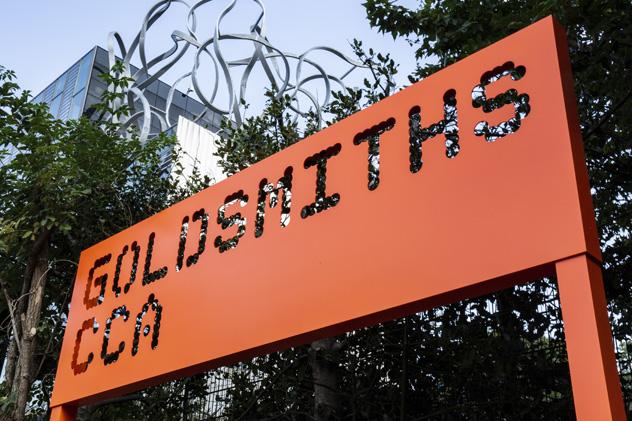BA (Hons)
Arts Management
Content navigation menu
Why study BA Arts Management at Goldsmiths
This programme will equip you for working in the arts and cultural industries, with a specific focus on management in the arts.
- Culture and the arts are vital to the global creative economy. On this exciting degree you'll develop a powerful combination of theoretical insights and professional skills to help prepare you for success in these sectors.
- You’ll learn how to understand arts and creative organisations – from small community endeavours through to world renowned organisations.
- You'll develop the skills to manage and run organisations such as museums, galleries, theatres, dance and live music venues, and cultural centres, and events such as festivals.
- The degree includes guaranteed work experience in your second year consisting of 30 hours spent with a professional arts organisation, where you'll develop a project in a real-world environment.
- In your final year you can also choose to complete a work placement, where you'll not only gain more practical experience, but also attend employability workshops. Alternatively you could choose to organise an arts event or carry out an extended case study project.
- You'll develop practical skills in audience development, events planning, and arts funding and fundraising.
- You’ll get the chance to learn directly from arts organisations and cultural businesses, through visits and talks.
- We're based in London – a global leader in the arts and one of the most important cultural centres in the world. London is the perfect place to study this subject, giving you unrivalled access to a diverse range of arts organisations. The city will become your classroom.
Contact the department
If you have specific questions about the degree, contact the Institute for Creative & Cultural Entrepreneurship.
UCAS code
N2V3
Entry requirements
A-level: BBB
BTEC: DDM
IB: 33 points overall with Three HL subjects at 655
Length
3 years full-time
Fees
Home - full-time: £9250
International - full-time: £19640
Department

There are lots of inspiring cultural events taking place on campus each week, from music shows to theatre productions.

Goldsmiths has its very own public art gallery on campus, where you can experience world-class exhibitions by international artists.
What you'll study
Year 1
The degree strikes a balance between theories associated with arts management and the practical demands of work in the sector. As a result, your first year will blend approaches to digital literacy and visual methods with applied knowledge of arts and events management. This will be complemented by an overview of business models for arts and cultural provision in London, and an introduction to fundraising.
You'll study the following compulsory modules:
| Module title | Credits |
|---|---|
| Principles of Arts Management | 15 credits |
| Digital Cultures, Digital Literacies | 15 credits |
| Arts in London | 15 credits |
| Identity, Agency & Environment 1 | 15 credits |
| Fundraising in the Arts | 15 Credits |
| Visual Culture | 15 credits |
| Events Management | 15 credits |
| Identity, Agency & Environment 2 | 15 credits |
Note about optional modules (if available): The above is indicative of the typical modules offered, but is not intended to be construed or relied on as a definitive list of what might be available in any given year. The module content and availability is subject to change.
Teaching style
This programme is taught through scheduled learning – a mixture of lectures, seminars and workshops. This includes visits to London and regional cultural organisations. You’ll also be expected to undertake a significant amount of independent study. This includes carrying out required and additional reading, preparing topics for discussion, producing essays or project work, and attending exhibitions, performances and events.
How you'll be assessed
You’ll be assessed by a variety of methods, depending on your module choices. These may include coursework, examinations, group work and projects.
Credits and levels of learning
An undergraduate honours degree is made up of 360 credits – 120 at Level 4, 120 at Level 5 and 120 at Level 6. If you are a full-time student, you will usually take Level 4 modules in the first year, Level 5 in the second, and Level 6 modules in your final year.
What our students say



Careers
There is a clear demand in the jobs market for people with the management skills to support the arts and cultural sectors, both domestically and abroad. The BA Arts Management degree puts you in a strong position for employability, as it provides you with the knowledge and skills that employers seek.
The arts and cultural sectors are varied, and suitable careers for graduates of this degree could include:
- Fundraising
- Events managment
- Business and planning
- Press and communications
- Arts education
- Arts and cultural production
Our former students are currently working at diverse organisations such as:
- The V&A (Victoria and Albert Museum)
- Design Museum
- London Short Film Festival
- English National Opera
- Whitechapel Gallery
- Singapore Art Week
- Aakash Odedra Company
They are also forging their own paths in the creative and cultural sectors, for example graduate Tala Lee-Turton who is a creative producer and professional dancer.
Skills
Through the degree you'll develop knowledge and skills in key areas such as:
- Events management
- Funding systems and fundraising
- Audience development and audience evaluation
- Budgeting and planning
- Working in cultural organisations
- Cultural policy development
With the wide range of skills you’ll develop, you’ll graduate understanding not only the practice within your chosen field, but also how it relates to the theory you’ve learned.
Entry requirements
We accept the following qualifications:
A-level: BBB
BTEC: DDM
International Baccalaureate: 33 points overall with Three HL subjects at 655
UAL Extended Diploma: Merit overall
Access: Pass with 45 Level 3 credits including 30 Distinctions and a number of merits/passes in subject-specific modules
Scottish qualifications: BBBBC (Higher) or BBC (Advanced Higher)
European Baccalaureate: 75%
Irish Leaving Certificate: H2 H2 H2 H2
Alternative qualifications and experience
See our full list of undergraduate entry qualifications.
We welcome students with a range of educational experiences. If you believe you may not meet the standard qualification requirements we would still encourage you to apply because we consider all aspects of your application when making a decision.
We’ll pay particularly careful attention to your personal statement, which is your opportunity to demonstrate your interest in the subject you’ve applied for. Your referees are also welcome to include any relevant contextual comments around your academic achievements. We’ll look at all these things when making a decision on your application, as well as your qualifications and grades, and may still be able to offer you a place.
International qualifications
We also accept a wide range of international qualifications. Find out more about the qualifications we accept from around the world.
If English isn’t your first language, you will need an IELTS score (or equivalent English language qualification) of 6.0 with a 6.0 in writing and no element lower than 5.5 to study this programme. If you need assistance with your English language, we offer a range of courses that can help prepare you for degree-level study.
Fees and funding
Annual tuition fees
These are the UG fees for students starting their programme in the 2024/2025 academic year.
- Home - full-time: £9250
- International - full-time: £19640
If your fees are not listed here, please check our undergraduate fees guidance or contact the Fees Office, who can also advise you about how to pay your fees.
It’s not currently possible for international students to study part-time if you require a Student Visa, however this is currently being reviewed and will be confirmed in the new year. Please read our visa guidance in the interim for more information. If you think you might be eligible to study part-time while being on another visa type, please contact our Admissions Team for more information.
If you are looking to pay your fees please see our guide to making a payment.
Additional costs
In addition to your tuition fees, you'll be responsible for any additional costs associated with your course, such as buying stationery and paying for photocopying. You can find out more about what you need to budget for on our study costs page.
There may also be specific additional costs associated with your programme. This can include things like paying for field trips or specialist materials for your assignments. Please check the programme specification for more information.
Student work
BA Arts Management final year exhibition
Final year students in 2020 created a virtual exhibition, 'Let's go digital, let's get active!'. The aim was to showcase culturally powerful artworks in a bid to encourage today's young generations to actively fight for a better society.
Issues depicted in the artworks include feminism, empowerment, mental health, and racism.


